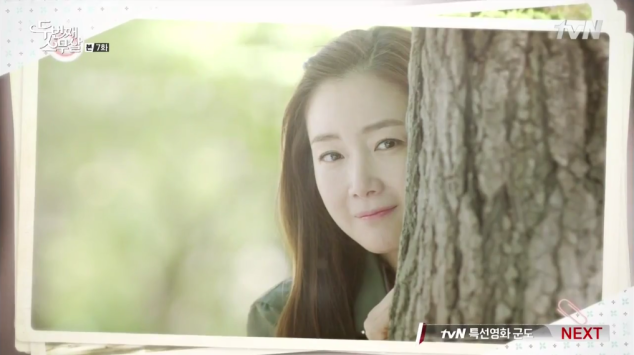This is a familiar sight in family photographs and illustrations: the wife wraps her arms sweetly around her child, the husband wraps his protectively around them. They are in love yet not quite in love.
Things are not entirely rosy beyond the halo around romantic and parental love. German thinker Friedrich Nietzsche (1844–1900) argued that love is really greed in disguise. Each party wants to possess the other and absorb something new from that person into himself. Even sympathetic love is dispensed to relish superiority over the “weak” party. Those craving for such love, in turn, are actually trying to wield the one power they may still have: the ability to get people to suffer for them.
When he was 23, Twenty Again‘s Kim Woo-chul, a psychology professor in the present day, was awestruck by a plucky young dancer who pulled herself up in no time after a loosened shoe caused her to fall on stage and carried on the performance barefoot, smiling brightly to the audience in spite of her bleeding wounds. He married her and for the next 20 years, did a number of things profoundly illogical for someone with his intellect: he cut off her contact with much of the world for fear that her teenage pregnancy would ruin his reputation, addressed her like an inferior and manipulated her life to suit his career needs. To rub salt into the wound, after creating these circumstances that transformed her into an ignorant, docile housewife, he now despises her, seeking instead a remarriage with his well-read colleague.
Ha No-ra (or, Nora Ha), his wife, has some striking similarities to the dutiful housewife in the Norwegian play A Doll’s House, Nora Helmer. The play’s Nora, however, may have been more complicit in her own misery. She shrewdly hams up her vulnerability to feed her husband’s ego, in the hope that he will love and make great sacrifices for her. When he proves to be as self-centered as Woo-chul, though, she realizes not only that she is a mere play doll to him, just as she was to her father as a complaisant child before marriage, but also that her children have been playthings to her.
Torvald Helmer, the husband in the play and a barrister-turned-bank-manager, shares Woo-chul’s vanity and self-absorption. The difference is that Torvald’s condescension toward his wife is shrouded in the language of affection. He tenderly refers to her as his “little song-bird,” “little squirrel,” “charming little Capri maiden,” etc, warning her against sweet foods for the sake of her teeth and coaching her in dance. It can almost obscure his perception of her as personal property and the fact that he is only delighting in the way his caring manners and her dependency affirm his relative strength. When a blackmail crisis sparked by her secret debt—one made to save his life—hits them, he, fretting solely for himself, treats her welfare as a casual afterthought and declares that no man is willing to give up honor for love.
Both Noras begin to assert their unique personhood and find their own lives. Mutual affection grows between Ha No-ra and her high school friend, Cha Hyun-seok. The overall breezy tone of the drama being what it is, the audience can trust that she is now in good hands. Nonetheless, the distances Hyun-seok does go to secure her welfare are perturbing in spite of his perfectly kind intentions. Without her prior knowledge, he fulfills her bucket list wishes, secretly buys and keeps her deceased grandmother’s food shop in business for 20 years, finds a job for her but plots things to make her think she chances upon it herself, and resolves her ex-husband’s own blackmail crisis in case the emotional impact on their son causes her worry. The last act becomes the final straw for her—finding his interference burdensome, she sorrowfully requests that he leaves her alone. That he does, except that he gets their friend to update him about No-ra and quietly watches her at work. Amazingly, she simply laughs at these and accepts him after some time apart.
For an inspiring tale about feminine independence, this compromising approach towards patriarchal paternalism seems an unfortunate blemish. Ha No-ra may have been merely emotionally unprepared for this kind of all-enveloping love, but in some other woman’s shoes, Hyun-seok’s unsolicited actions may come across as suffocating. Even though there is nothing possessive or exploitative about his behavior—an assumption not necessarily true in real life—he effectively returns her to an unbalanced power relationship. Yet, one of the most fundamental underpinnings of respect for a human being is arguably the recognition of his or her capabilities, or at least the potential to develop various capabilities. By doing everything for No-ra, Hyun-seok is unknowingly denying her the space to grow and prove herself, while building up his own strengths. It adds a new dimension to Nietzsche’s concept of love as conquests.
At this juncture, some would caution that although males and parents are the aggressive parties in all the above relationships, it is possible for gender and parent-child roles to be reversed. Wives can nanny and bully husbands into desired behaviors, which may feel doubly hurtful on the part of the men due to lingering societal notions about masculinity. Children, too, can engage in reverse helicopter parenting or speak in patronizing tones to their parents, especially elderly ones, while parents of all ages may unconsciously play martyrs. Gender and familial stereotypes should not stop us from recognizing the problem in its different guises.
Not all power gained through romantic or parental relationships is deplorable. It seems harsh to forbid someone from developing self-esteem and competence by helping others. Besides, human nature is imperfect, so there is often a practical need to exert some reasonable amount of control over each other, such as promises of faithfulness, financial prudence and aversion from self-injurious behavior, to make relationships work. The key issue is to ensure that: (i) the well-being of the loved one comes before personal payoffs, (ii) power is equally distributed as far as practicable and (iii) everyone has some appropriate amount of room for himself.
Nietzsche may have just the right antidote that counters the excesses of romance-related power dynamics to secure this: friendship. Of course, friendship is not as innocent as it promises to be all the time. Torvald, perversely, likes his friend, Dr. Rank, around the house because the physician’s loneliness and chronic illness are a nice contrast to the Helmers’ apparent familial bliss, “a cloudy background to our sunlit happiness.” Hyun-seok has carried a torch for Ha No-ra almost all along. Even so, the best examples of friendship have much to offer: openness, rationality and comfortable distances between each other. They temper the mystery, sensuality and longing for intimate connection that draw a person to another yet entrap them in unconscious power plays in the first place. In contrast, all three couples above keep facts or opinions concerning the other to themselves for lengthy periods. Among them, the two Noras fantasize their spouses as heroic protectors at the beginning, the fiction that leads them to enslave themselves for nothing.
With young children, friendship may be more difficult. A greater amount of authority than friends usually have over one another is often necessary to guide their growth. Moreover, they may not be emotionally ready to bear the troubling disclosures of adults. The idea of parents and children as “buddies” may also be upsetting in light of some cultural notions of decorum. A more suitable relationship may be that of mentors and mentees. In proper mentorships, mentors do not see their charges as personal articles or objects of amusement. They know that their rightful role is to help mentees better themselves, even to the extent that the protégées become their equals or superiors.
What is being advocated, however, is not complete substitution for romance and kinship. Neither blood ties nor the exclusiveness of romantic bonds is guaranteed in friendship and mentoring. Nora Helmer’s complete cutting of ties with her children is actually unfathomable to many real-life mothers. Making three innocent youngsters suffer for her error in mate choice does not seem very fair either. Although the Helmer household has ample physical and manpower resources to provide for them, they may start to question their worth to their absent mother. To children, a doll-like existence may still be more desirable than that of abandoned dolls. And the outcome may be Ha No-ra, who grew up missing out on much love and affection after her widowed mother left her when she was only four, an experience that may have disproportionately enhanced Woo-chul’s appeal to her when his courtship began. Nora Helmer does have the very reasonable rationale of needing the space to find herself, but self-discovery and growth are endeavors that may have no endpoints. They are probably ongoing processes even for some centenarians. A more mutually beneficial strategy may be to set some time limit for her mission and promise her children contact after this period.
Freed of its darker sides, what remains as true love must prevail—and open up real skies for everyone.






Special thanks to illustrator colorpencil2014 for the expression of support in the prelude to this post.
colorpencil2014 for the expression of support in the prelude to this post.